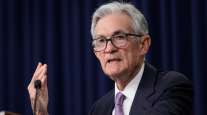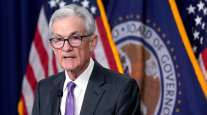Fed Leaves Interest Rates Unchanged

Federal Reserve officials left interest rates unchanged, acknowledging inflation is close to target without indicating any intention to veer from their gradual path of interest-rate increases.
“Inflation on a 12-month basis is expected to run near the committee’s symmetric 2% objective over the medium term,” the policy-setting Federal Open Market Committee said in a statement May 2 in Washington. “The committee expects that economic conditions will evolve in a manner that will warrant further gradual increases in the federal funds rate.”
Officials may have signaled their willingness to allow inflation to exceed their 2% goal somewhat by adding a reference to the “symmetric” nature of their target.
The FOMC also noted the weakness in growth in the first quarter, removing a reference in the March statement that the economic outlook had “strengthened in recent months.” They balanced that out by noting strong growth in business investment.
The yield on 10-year U.S. Treasury notes slipped slightly to 2.96% following the release of the statement, while the S&P 500 Index of U.S. stocks climbed to its highest level of the day and the Bloomberg Dollar Spot Index fell.
U.S. economic growth cooled in the first quarter to an annualized pace of 2.3% after averaging higher than 3% in the previous three quarters.
The decision to maintain the federal funds target range at 1.5% to 1.75% was a unanimous 8-0.
Three-to-Four Hikes
The Fed’s commentary is unlikely to change investor expectations that policy makers will raise interest rates for the second time this year when they reconvene in June.
Officials left unchanged their view that near-term risks to the economic outlook appeared “roughly balanced.” That suggests policy makers are not ready to steepen dramatically the path they’ve projected for slowly raising rates.
The Fed lifted its benchmark rate three times last year — while also beginning to slowly trim its balance sheet. Officials indicated in March they expect a total of three or four hikes in 2018.
The FOMC’s two-day meeting followed the release of data April 30 that showed inflation measured by the central bank’s preferred gauge had hit its 2% target after being below that goal for almost every month since April 2012.
Policy makers aim to keep inflation near target while ensuring maximum sustainable employment and preserving a U.S economic expansion that is now the second longest on record.
Year-on-year growth in the personal consumption expenditures price index reached 2% in March, up from 1.7% in February. The jump was driven more by year-ago price drops in telecoms and pharmaceuticals than by recent price gains.
— With assistance by Matthew Boesler




